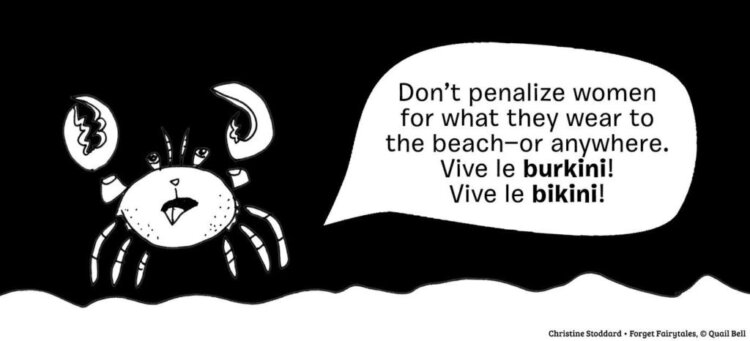
Welcome back to Feminism 101, where we attempt to tackle all the questions and queries you have about the F-word. Today’s question comes to us from Grok Nation reader Tamara H.:
What are the different feminist perspectives on whether the burkini should be banned? My current understanding is limited to “Yes, we shouldn’t encourage something that oppresses women” vs “No, banning it takes away women’s right to choose.”
Thanks for your question, Tamara! You’re definitely not alone in wondering what feminism’s stance is on the burkini. However, feminism as an ideal doesn’t have one voice/opinion, especially when it comes to issues that involve not only sexism but racism as well. Instead of one answer, Tamara, you’re getting 12 solid responses from some pretty fabulous feminists:
“One of the problems with these ‘laws’ is in assuming that the burkini is oppressive to all women in the first place, which is definitely taking away a woman’s autonomy. This attempt at regulation is full of misogyny and Islamophobia, masquerading as ‘helping women.’ Humiliating women for their choices does not help them.” — Sara Habein
“I was pleased to see that a court in France has at least temporarily suspended the ‘burkini ban.’ And that’s not at all because I understand any religious dictate that demands women cover their bodies, heads, faces — I don’t. I have no idea how I would feel if I had been born into a culture or religion that demanded that of me. From my totally secular, feminist perspective, I like to imagine I’d resist and rebel. But the truth is, I have no way of knowing. What I do know is, no matter how much I resent women being told what to do by their religion, I hate it just as much when it comes from government. The French government claims it has compelling reasons to ban the so-called burkini, but it’s difficult to see anything other than paternalism, bigotry, and yes, sexism. Telling women they need to bare their bodies is just as controlling as requesting they cover up. And before we get to feeling too superior to the confused French, let’s remember that here in the USA we have politicians who spend inordinate energy trying to control women’s bodies as well. I’d love to see women band together, worldwide, to just agree that we can dress, love, and reproduce as we please.” — Kate Tuttle
“Burkinis should absolutely not be banned. Feminism is about choice. Choice to wear a lot of clothes or none at all and not be judged. If we say this ‘oppresses women’ and ban it, what we actually do is take away the rights of women to do what makes them comfortable. And that’s not feminism at all.” — Casey O’Brien
“I can’t separate the racism and Islamophobia from the feminism in this issue. As a feminist this is what I want: I want every woman to have the choice to practice her religion, or no religion, as she sees fit. If that means being a nun and wearing a habit, or being a Mormon and wearing specific undergarments, or for Hasidic women to dress modestly, or for Muslim women to wear a hijab, abaya, burqa, burkini, or whatever they want.
Obviously that is not the world we are living in now. The burka, in particular, has come to represent the oppression of Muslim women around the world. The uproar this has caused frequently silences the very women we say we want to set free. Here’s an idea — how about we ask the women wearing the burkinis? The ones on the beach seemed pretty pissed. How do you ‘free’ women by passing laws about what we can wear? How is banning an item of clothing less restrictive than requiring it?” — Graeme Seabrook
“For me, opposing banning the burkini is much more complex than ‘women’s choice.’ I actually don’t agree that feminism is about supporting all women’s choices. Lots of choices aren’t feminist and that’s fine, but choice is not a good litmus test for feminism.
However, any perspective that supports banning burkinis ignores the voices of Muslim feminists such as Huda Jawad who have explained how wearing hijab can be a part of a feminist identity. Muslim women have been TELLING non-Muslim women for decades to not assume that all who wear hijab are forced to wear it. In fact, the choice of hijab is an important spiritual part of the practice of Islam. French women wearing burkinis are simply Muslim women who cover who want to go swimming. Reading their swimming garb as oppressing them denies them their agency and their voices, as well as limits their ability to move in French society freely.
There was a photo of a Muslim woman being forced at gunpoint to remove her burkini last week. Is THAT not oppression? Freedom from patriarchy has never come from a man pointing a gun at a woman and telling her how she needs to dress.” — Krista Benson
“If you ban a Burkini because you think it oppresses women, how are you gonna look at yourself in the mirror after you just made a law telling women what they can and can’t wear, you hypocritical oppressor of women! Why don’t we leave it to women who want to wear Burkinis to decide whether or not they are being oppressed and then believe what they say?” — Caissie St. Onge
“Feminism, for me, is about balancing personal freedoms with making the world a better and safer place for all women. Women should be free to choose whatever clothing suits them best, and be empowered to make that choice freely. Forcing women out of their clothing, in public and at gunpoint no less, is not an empowering act. Instead, we need to focus on providing the kinds of social services necessary for women to be able to make their own choices.” — Bex vanKoot
“The idea that we are still policing women’s clothing in any way, for any reason, is absurd to me as a feminist. It is obviously wrong to attempt to force women to wear (or restrict women from wearing), anything. Ever. Period. Forever. (Sidebar: On the specific subject of the “burkini”, if you think muslim women — or any women who choose to cover up for religious or cultural reasons — need your opinion, newsflash, they don’t. SO SHUT IT.)” — Jen Selk
“White feminism, not least of all in France, has a long history of purporting to know what’s best for Muslim women without bothering to actually ask Muslim women. The French state, like the US, has responded to terrorist attacks by vilifying all Muslims and unleashing a wave of Islamophobia. The result? Women in both countries face racism, hate crimes, police repression, and even imprisonment just for leaving their houses and existing in the world wearing clothing of their own choosing — just like they did in French-colonized Algeria. If your feminism makes you identify more with conquerors, colonizers, and racists than with women of color, I hate to break it to you, but you’re doing feminism wrong.” — Sarah Grey
“The history of the burqa, the various reasons why it continues to exist, and the fact that it is viewed as a symbol of oppression are all conversations that must take place; these are debates that must be had. But these are not conversations for you — unless you and/or the women in your family have a shared history with this garment. These are not debates for you or for me. These are not debates for men. These are not debates for governments or for law enforcement. We have no place at this table.
Perhaps you should consider that the burkini offers women the same sort of freedom and ability as the one-piece swimsuit, the spandex shorts, the yoga pants, and yes, even the bikini. Thanks to the burkini women can now spend time with their families in the water; they can enjoy the sun; they can exercise to get fit; they can splash about in the water and feel nothing but the pure joy that only being in the water can bring. And tell me this – would you deny women that joy? Would you want to?” — Awanthi Vardaraj
“I wish people would stop using women’s bodies as battlegrounds in the culture wars. Women are not objects, and what we do with our bodies is for us to decide. Banning certain types of clothing is as problematic as compelling women to wear certain types of clothing. Maintaining women’s freedom of choice–even if others might disagree with what women choose — is crucial.” — Rebecca Hains
“I’m a feminist but I agree with the ban. How on earth are we, as a society, supposed to body shame women if we can’t even see them?” — Katharine Heller
Do you have a question for our cabal of fabulous feminists? Email it to Avital Norman Nathman at TheMamafesto@gmail.com!


Grok Nation Comment Policy
We welcome thoughtful, grokky comments—keep your negativity and spam to yourself. Please read our Comment Policy before commenting.